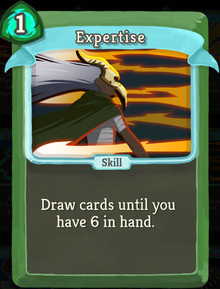CS106L(7-13): Slay the Spire
Good
earlymorning. Have you played this game?

Today I need to speed up, because I need to finish this C++ journey before Christmas 🎄, so I can enjoy my holiday 🏖️
Therefore, I decide to quickly go through some lectures today. This strategy is just like this card in the game Slay the Spire. Haha!

Although I’m far from Expertise, I start to draw…
Lecture 7 - Template Functions [🃏 Card 0]
To handle user-defined type:
template <typename T>
T my_min(T a, T b) {
return a < b ? a : b;
}
template <typename T>
T my_min(const T& a, const T& b) {
return a < b ? a : b;
}
template <typename T, typename U> // U Accounting for the fact that the types could be different
auto my_min(const T& a, const U& b) {
return a < b ? a : b;
}
Note: Scope of template argument T is limited to this one function!
Template Initialization: Implicit/Explicit
Template functions are not functions,they’re a recipe for generating functions via instantiation.
Variadic templates
This pattern-matching happens at compile time, not runtime.
// base case
template <typename T>
auto my_min(const T& num) {
return num;
}
template <typename T, typename ...Ts> // Parameter pack: 0 or more types
auto my_min(T num, Ts... args) {
auto min = my_min(args...); // Pack expansion: comma-separated patterns
if (num < min) min = num;
return min;
}
f(h(args...) + args...);
// f(h(E1,E2,E3) + E1, h(E1,E2,E3) + E2, h(E1,E2,E3) + E3)
Lecture 8 - Functions [🃏 Card 1]
Their Assignment 1
Use lambdas, STL functions, iterators to extract link in the website and analyse the keyword.
- Element search with
std::find - Subsequence search with
std::search - Elegant evaluation with
std::all_of- returns a bool representing whether all of the elements between first and last satisfy p.
General Way to solve problem:
template <typename InputIt, typename DataType>
int count_occurrences(InputIt begin, InputIt end, DataType val) {
int count = 0;
for (auto iter = begin; iter != end; ++iter) {
if (*iter == val) count++;
}
return count;
}
vector<string> v; count_occurrences(v.begin(), v.end(), “test”);
Concept lifting
Generalization: A predicate is a function which takes in some number of arguments and returns a boolean.
- Unary Predicates: take in one param
- Binary Predicate: take in two params
Use Predicate:
template <typename InputIt, typename DataType, typename UniPred>
int count_occurrences(InputIt begin, InputIt end, UniPred pred) {
int count = 0;
for (auto iter = begin; iter != end; ++iter) {
if (pred(*iter) == val) count++;
}
return count;
}
Lambda functions
int main() {
auto print_int = [](int x) {
cout << x << endl;
};
// print_int is a function now!
print_int(5); // “5”
print_int(7); // “7”
// what type is print_int? who cares!
}
Lambda capture allows you to pass information in, making the function is maximally generic and portable.
seems like the information is a constant input defined once, and another input is from the program.
int main() {
int limit;
std::cin >> limit;
auto is_less_than = [limit](auto val) { // can use auto in lambda parameters
return (val < limit) };
}
auto: don’t need the type. capture clause: Capture clause—lets use outside variables
auto lambda = [capture-values](arguments) {
return expression;
}
[x](arguments) // captures x from surrounding scope by value
[x&](arguments) // captures x from surrounding scope by reference
[x, y](arguments) // captures x, y by value
[&](arguments) // captures everything by reference
[&, x](arguments) // captures everything except x by reference
[=](arguments) // captures everything by copy
Algorithms & STL
STL is a collection of generic template functions, and it operates on iterators.
Examples:
-
std::count_if(InputIt first, InputIt last, UnaryPredicate p);Counts the number of elements between first and last satisfying p. -
std::find(InputIt first, InputIt last, UnaryPredicate p);Finds the first element between first and last satisfying p. -
std::sort(RandomIt first, RandomIt last);Sorts the elements between first and last. -
std::minmax_element(InputIt first, InputIt last);Returns a tuple [min, max] over the elements between first and last. -
std::stable_partition(InputIt first, InputIt last, UnaryPredicate p);Reorders the elements between first and last such that all elements for which p returns true come before those for which it returns false. -
std::copy(InputIt first, InputIt last, OutputIt target);Copies the elements between first and last into target. (There’s also a std::copy_if).
STL can do many things:
- binary search
- heap building
- min/max lexicographical comparisons
- merge
- set union
- set difference
- set intersection
- partition
- sort nth sorted element
- shuffle
- selective removal
- selective copy
- for-each
- move backwards
Lecture 9 - STL Summary [🃏 Card 2]
The Big STL Recap
- Streams
- Containers
- Iterators
- Templates
- Lambdas
- Algorithms
Can we discover an author’s identity from their writing?
Authors have an underlying writing style.
Similar question: Can you discover fabbit’s identity from its writing?
The vector representations of the frequencies of our function words
-
[I, the, there]
- [ 4 , 1 , 1 ]
- [ 1 , 0 , 1 ]
-
The closer the angle, the more similar the texts
-
“Stylometry” project
Lecture 10 - Classes I [🃏 Card 3]
Seems there are another course called CS106B that is the essential of C++, will take a look later.
Classes
Classes and structs are almost the same.
No public variables
Control the way info is accessed and edited.
Template classes allow for flexibility.
Lecture 11 - Const correctness [🃏 Card 4]
Const references
A const reference allows you to read the variable through that alias, but not modify it.
Const Members
- A const member function is a function that cannot modify any private member variables.
- A const member function can only call other const member functions
Const Summary
- const reference
- a reference that cannot be used to modify the object that is being referenced.
- const method
- a method of a class that can’t change any class variables and can only call other const methods.
- const object
- an object declared as const that can only call its const methods
const_iterators
const_iterator points to const objects
Lecture 12 - Operators [🃏 Card 5]
Operator Overloading
- Overload the existing method
- Don’t overuse operator overloading!
Lecture 13: Special Member Functions [🃏 Card 6]
Special member functions are (usually) automatically generated by the compiler:
- Default construction: object created with no parameters.
- Copy construction: object is created as a copy of an existing object.
- Copy assignment: existing object replaced as a copy of another existing object.
- Destruction: object destroyed when it is out of scope.
Member initializer lists
template <typename T>
vector<T>::vector<T>() :
_size(0), _capacity(kInitialSize),
_elems(new T[kInitialSize]) { }
-
Prefer to use member initializer lists, which directly constructs each member with a given value
-
The default compiler-generated copy constructor and copy assignment functions work by copying each member variable
Assignment Operator
- Check for self-assignment.
- Make sure to free existing members if applicable.
- Copy assign each automatically assignable member.
- Manually copy all other members.
- Return a reference to
*this(that was just reassigned).
Haha, congrats, now you have 6 cards in the hand! Do you want to IMMEDIATELY travel to the boss?

Oh no, Corruption!
